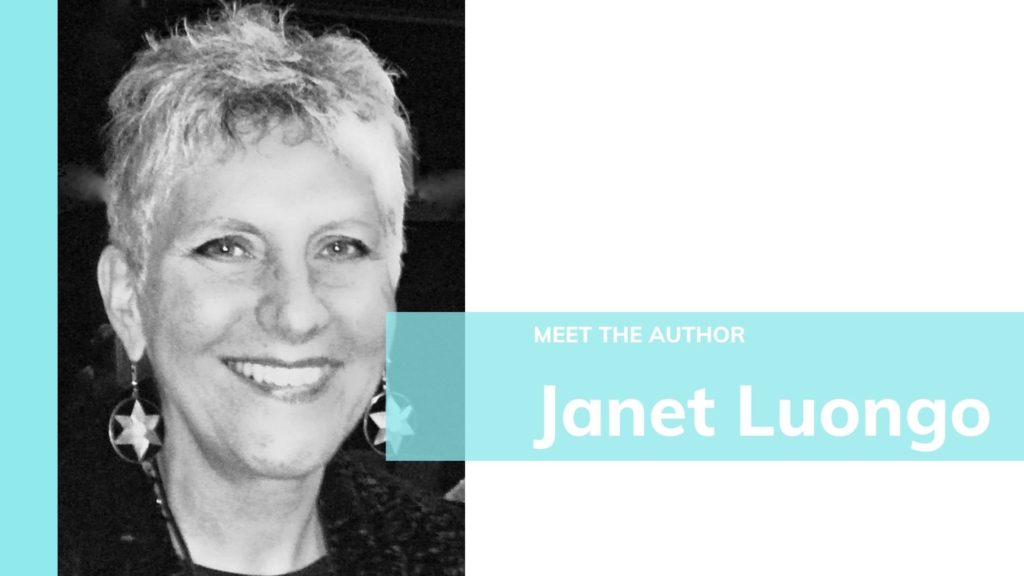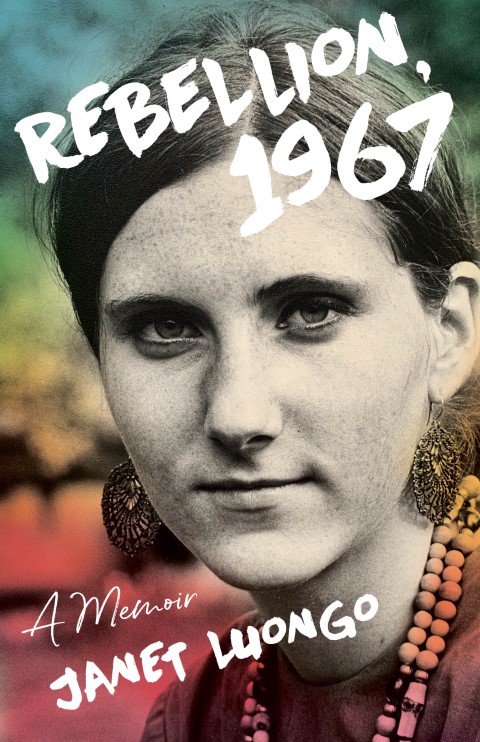
Janet Luongo creates stories and art, gives speeches and workshops, and works for racial and gender justice. Janet spent a decade — first with writing groups and editors and then on her own –completing her coming of age story, Rebellion, 1967: A Memoir. Her first book, 365 Daily Affirmation for Creativity, with a foreword by Jack Canfield, was published in five countries and led to bookings as far away as Xian, China. Janet served as president of the New York Metro chapter of the National Speakers Association. She taught art to students from college to kindergarten; exhibited paintings in New York, Geneva, and Paris; and designed programs in Connecticut museums to connect urban and suburban students, programs that garnered awards and media.
Welcome Author Janet Luongo
Thank you for being a part of my meet the author series! Could you tell us a little more about yourself? Where do you find creative inspiration to do what you do?
Alison, so glad to talk to you. I find creative inspiration in natural settings, particularly when I feel surrounded by spaciousness. When my feet touch the surf of the ocean, which flows around the globe and somewhere it is lapping on land that I cannot see, I feel that somehow we all are connected – sand, crabs, dunes, gulls, water, air, sun and moon. It is the mystery that moves me to explore what my own life might mean in the light of such spaciousness. In my meditation practice, I attempt to feel that spaciousness within me as well. In the stillness I listen for guidance. On some days, I’m blessed with ideas, and at times I even hear the flow of whole sentences. I move quickly to capture the words.
What are your favourite things to do, your hobbies other than writing?
I love hiking in the forests and mountains – its immensity is another reminder of spaciousness. With my husband and son, daughter-in-law and granddaughter (age 5), I explore the Rockies in Colorado. I love spending time with close friends and family who give loving support. My Unitarian Universalist congregation is like a big family after 35 years of belonging. I spend a portion of my week paying attention to the “common good” and what’s needed to keep our democracy robust. I take action and urge others to do the same. Every day I read articles and chapters in a book, which inform me, calm me, and stimulate my creativity.
Do you like reading books by specific authors?
The authors who inspired me many years ago to write my story: Doris Lessing, Joyce Carol Oates, Toni Morrison, Sue Kidd Monk, Margaret Atwood. As I was writing, I read books about memoirs – particularly by my favorite memoirist, Mary Karr, along with Abigail Thomas. I marveled at how Frank McCourt told such a tragic story in Angela’s Ashes, yet managed to somehow make it funny. It’s a real gift to find humor in tough situations. I thoroughly enjoyed the memoirs of Cheryl Strayed, Tina Fey, Michelle Obama, and Sally Fields. I recently became riveted by the brutally honest memoir, Blow Your House Down, by Gina Frangella.
Because much of my memoir is about one year during the civil rights movement when I enjoyed relationships with several Black people, a time when I examined my society, family and my own attitudes regarding race, I find it fascinating to read history and books with ideas on how to create a just and multi-racial democracy. I recommend a brilliant and earnest author, Dr. Ibram X Kendi, who wrote How To Be an Anti-Racist.
Inspiration for writing Rebellion, 1967

Rebellion, 1967: A Memoir was a page turner for me, poetically written. It takes a lot of courage to tell your story and I couldn’t get enough of it.
Alison, first, I’m so glad to hear you found my book a “page turner” and “poetic” because my chief goal was to write a story that was engaging, and to craft that story with compelling language. The memoir’s main theme of course is about an individual, an Irish girl from Queens, New York City – me at seventeen turning eighteen – dealing with all the struggles with identity, independence and sexuality that adolescence involves. My second theme is family, and as we broke into bits, I often learned more than I needed to know, and got so fed up with the instability, I demanded to live on my own.
My third theme is the Sixties, an era of draft resistance and free love, a society in which influential liberation movements were born – for women, youth, and People of Color. Rev. Martin Luther King Jr was my idol. My father worked as a New York City Police officer who walked beats in poor Black neighborhoods. He was perhaps rare in believing that police need to unlearn their prejudices, as he tried to do. I admired him for consciously avoiding passing down what he called the “poison” of prejudice to me and my two sisters, and he welcomed our Jewish and Black friends. However, he exploded when I had a Black boyfriend, a reaction which turned my life around.
It was amazing to know the history behind your story. How much research did you put into the setting for your memoir?
Most of the settings for my memoir are derived from personal memories, but I did many months of research on background and to confirm facts about history and events that I had learned when I was in high school from books and media and in discussions with my father. From his experience in policing oppressed neighorhoods in New York City, he discussed with me how redlining and housing discrimination caused segregated ghettos and schools; in turn, poor education and job discrimination created poverty that led to substance abuse, crime and anger. He feared those conditions were like a powder keg, and, predictably, the streets exploded in Harlem. He was called in for duty during the Harlem riot of 1964. He later drew comparisons to the Draft Riot of 1863, also in New York City.
This was where the historical research became eye-opening. He showed me a book written just after the Draft Riot of 1863, when the Irish (our ancestors) caused more destruction, injuries and death than the Harlem Riot a century later. Many students in schools never learn the appalling history of riots by White people. While at City college, after classes, I determinedly sought education from first hand experience. I got involved with a community activist group in South Jamaica, Queens, which sought funding from President Johnson’s anti-poverty program, part of his vision of the Great Society. In 1965, under pressure from Rev. Martin Luther King Jr., Johnson signed the Voting rights Act after which, for the first time, America matured into a truly democratic society. My involvement made me feel like I was part of history in the making – when America was growing up like I was, reaching to make dreams and ideals a reality.
Do you keep a journal of experiences to remember moments in your life?
Yes. Luckily I developed the habit of keeping journals at an early age. My first drafts of this story are based on journals that I kept in 1966 and 1967. The pieces of memories captured there stimulated me to remember deeper and more significant scenes, dialog, and emotions.
Let’s talk about the messages in your memoir. What do you want to share or pass onto readers?
In brief, my memoir is about an idealistic girl, Janet Duffy, who lives on her own and explores New York City. She leaves college to study art, and falls in love with a talented Black saxophone player. After her father blows up about their relationship, she runs away with her boyfriend to pursue the artist’s life. Unfortunately, they are too young and too broke to succeed. Janet deals with poverty and danger until she finds the courage to ask for help in getting back on track so she can fulfill her dreams.
The message of the story for my readers: You are stronger than you may realize. Know yourself and be brave in expressing who you are. Be curious and adventurous. Make mistakes – that’s how we grow – but learn from them. We need to keep hope that healing and change are possible. Dealing with trouble can teach us about ourselves and others, build resilience, and educate us about real life, which is messy and imperfect. The struggles are what make us appreciate the joys.
How hard did you work to get here?
After a couple drafts written decades apart, in 2011 I became serious about finishing my memoir. I sat down to write and to read my pages aloud in a weekly writing group; I worked with editors and revised and revised some more. In 2021, my book is being published by She Writes Press, an award winning Indie publisher. Yes, I’d say for ten years I worked very hard. And consistently, and with determination.
What scene or memory brought you joy with writing?
Painting murals with a mentor, working with community activists, dancing at a club to the Rolling Stones and Stevie Wonder, making love, marching with Rev. Martin Luther King Jr, going to a Charles Lloyd jazz concert, hearing the rhythm of Olatunji’s drums, wearing beads to love-ins in the East Village during the Summer of Love, 1967.
What’s next for Janet
Are you planning to write another book? Could you share a little more on what you plan for your next step in this journey?
After this ten year journey creating a book, I am celebrating! I am enjoying a vacation and paying more attention to the beloved people in my life. I feel moved to act for climate change and justice and democracy… Yet I continue to journal, jot down poems, and make notes of ideas for short stories and essays. After my memoir of 1967, will I write a sequel and tell the story of 1968 – 1970, when my life unfortunately got much worse before it got better? I believe it would be a good story; I’ve learned so much about the art and craft and discipline of writing; I feel the tug to write it. Will I find the space and courage to reveal the story? Only time can tell.
What advice would you give anyone wanting to become a writer?
If you feel in your bones you are a writer, honor that. The act of writing is solitary, so if you are comfortable being with yourself, pursue it. A good memoir is about truth, so be prepared to explore who you and other people really are in all our varied aspects and dimensions. No one wants to read about characters who are perfect, one dimensional, with no problems to overcome. We are complicated beings with a whole range of emotions and experiences. Sometimes digging deep to discover the heart of ourselves hurts, but bringing pain into a place where it can be named and seen will bring understanding, wholeness and peace.
Thank you Alison for this opportunity to share my reflections.
Connect with Janet Luongo
Readers, Kim would love to hear from you. You can connect with her here.
Website | Twitter | Facebook | Instagram | YouTube
Thank you so much Alison, for interviewing me. I liked your questions.
Tonight I celebrate the publication (after 10 years of a labor of love)
by dancing to Sixties rock!